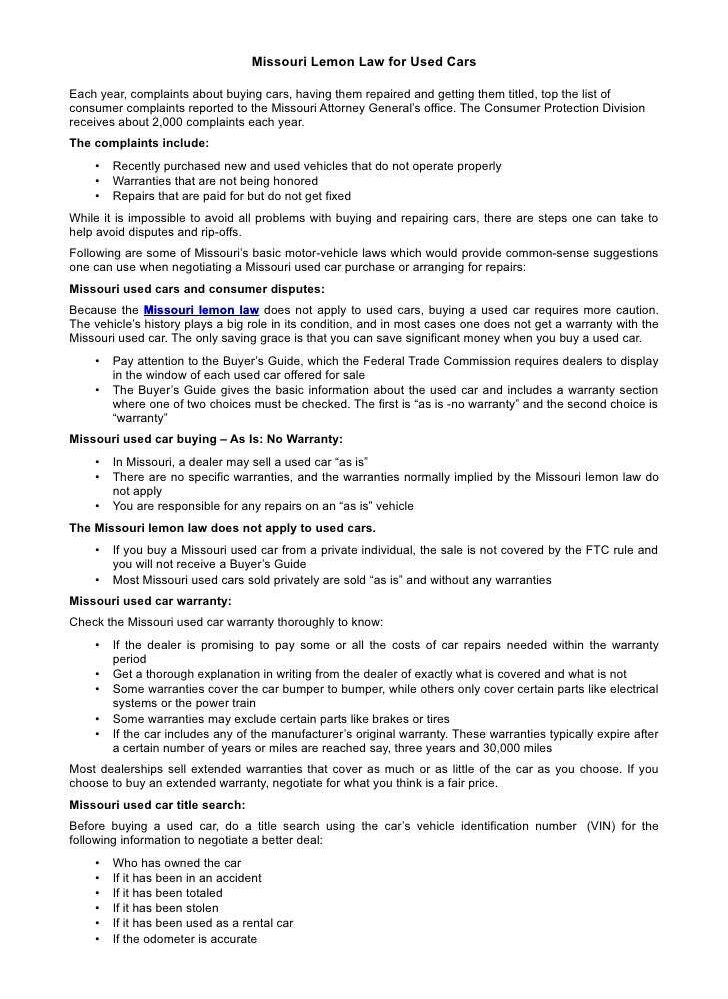Missouri Lemon Law on Used Cars: What to Know
Have you ever purchased a car only to find yourself dealing with a never ending cycle of repairs and annoying breakdowns? It’s a situation that many individuals encounter and it can be quite disheartening. Luckily Missouri has a Lemon Law in place to safeguard consumers in such circumstances. This legislation is aimed at assisting those who end up with faulty vehicles that fall short of their fundamental standards for reliability and safety. If you’re feeling burdened by car issues gaining insight into this law could provide you with some comfort and perspective.
What is the Missouri Lemon Law?

The Lemon Law in Missouri is a legislation that offers solutions for people who buy or lease cars that prove to be faulty. Referred to as the Missouri Lemon Law it comes into play when vehicles have defects that remain unfixed despite several attempts to repair them. Lets take a look at how this law functions.
- Definition: The law defines a “lemon” as a vehicle with a substantial defect that impairs its use, value, or safety.
- Coverage: It primarily covers new cars, but there are specific provisions for used cars as well.
- Process: If your vehicle has been in the shop multiple times for the same issue, or if it’s out of service for an extended period, you may have a case under this law.
Grasping the details of this law is essential, especially if you’re dealing with persistent car issues. Think of it as a backup plan that could assist you in securing a refund or a replacement car when things don’t go as planned.
Eligibility for Protection Under the Lemon Law

Not all individuals facing issues with their vehicles will be eligible for coverage under the Missouri Lemon Law. To determine if your case meets the laws criteria it’s crucial to grasp the eligibility requirements. Here are the key points you should be aware of.
- Vehicle Type: The Lemon Law primarily covers new cars purchased or leased. However, if you bought a used car from a dealership, there might be specific protections available under different regulations.
- Defect Criteria: The defect must significantly impair the vehicle’s use, value, or safety. Minor issues or cosmetic defects typically do not qualify.
- Repair Attempts: You must have given the dealer or manufacturer a reasonable number of attempts to fix the defect. Generally, this means at least three attempts for the same problem, or the vehicle must be out of service for at least 30 days.
- Time Frame: The issues must occur within the warranty period or within a specific timeframe after purchase. This period is typically one year or the duration of the warranty.
Consider it a precautionary measure if your vehicle has consistently underperformed and the problems align with these criteria the Lemon Law could offer you a way out. Its all about ensuring that you receive value for your investment and that your car upholds essential reliability and safety standards.
Steps to Take if You Believe Your Car is a Lemon

Discovering that your car could be a dud can hit you hard. I recall a friend of mine who got a gleaming vehicle only to end up making visits to the mechanic. It was quite a stressful experience but having a plan in place to address it helped her regain her composure. If you ever find yourself facing a scenario like this here’s a roadmap to assist you in navigating through it.
- Document Everything: Start by keeping detailed records of every issue and repair attempt. Note dates, times, and what was discussed with the repair shop. This documentation will be crucial in building your case.
- Contact the Dealer: Notify the dealership or manufacturer about the recurring problems. Provide them with a chance to resolve the issue. It’s often required that you give them a reasonable number of attempts to fix the defect.
- Request Repairs: Make sure you request repairs in writing, and always ask for a detailed repair order. This will serve as proof of the attempts made to fix the defect.
- Consult with an Attorney: If the issues persist and you feel the dealer isn’t addressing the problem adequately, consulting with a lawyer who specializes in Lemon Law cases can provide you with legal advice and help you understand your rights.
- File a Complaint: If necessary, you can file a complaint with the Missouri Attorney General’s Office. They can provide additional guidance and potentially mediate the situation.
While these actions might appear overwhelming approaching them carefully could greatly enhance your likelihood of achieving a positive outcome. It’s all about staying determined and making sure you receive what you truly deserve.
Documentation and Evidence You Need
- Repair Records: Keep copies of all repair orders, invoices, and any correspondence with the repair shop. Each document should detail the defect, the date of service, and the repairs attempted.
- Warranty Information: Your vehicle’s warranty details will outline what’s covered and for how long. This information is crucial in proving that the defect falls under the warranty period.
- Communication Records: Save all communications with the dealer or manufacturer. This includes emails, letters, and notes from phone calls. It’s helpful to have a clear record of what was said and promised.
- Photographs and Videos: Visual evidence of the defect can be very persuasive. Take clear photos or videos of the issues you’re facing, especially if they are recurring or not easily visible.
- Testimony: Statements from independent mechanics or automotive experts can provide additional support to your claim. Their professional opinions can help validate your concerns.
Putting together all this proof strengthens your argument showing the persistent problems with your car. It’s akin to fitting together the parts of a jigsaw puzzle where each document contributes to forming a comprehensive view of your circumstances.
How the Lemon Law Process Works
The Lemon Law process may appear intricate initially, but grasping the steps can simplify things significantly. Drawing from a relatives experience with this journey I can say that although it demands some perseverance its purpose is to uphold fairness. Let me outline the usual procedure for you.
- Initial Complaint: Begin by formally notifying the dealer or manufacturer of the defect. This is often done through a written letter outlining the problem and requesting repairs.
- Repair Attempts: Give the dealer a reasonable opportunity to fix the defect. The law usually requires at least three repair attempts for the same issue or a cumulative total of 30 days out of service.
- Determination of Lemon Status: If the dealer fails to resolve the issue, you may then seek a determination from the manufacturer. They might offer a refund or replacement if they agree that the vehicle qualifies as a lemon.
- Mediation or Arbitration: If an agreement cannot be reached, you may have to go through mediation or arbitration. This is a less formal process where a neutral third party helps facilitate a resolution.
- Legal Action: As a last resort, you may file a lawsuit against the dealer or manufacturer. This step often requires the assistance of an attorney specializing in Lemon Law cases.
Grasping these stages can unravel the procedure and assist you in managing your claim with greater efficiency. Its about adhering to the course of action to guarantee that your vehicle aligns with the standards it was meant to and that you receive the fairness you rightfully deserve.
Possible Outcomes of a Lemon Law Claim
When you submit a Lemon Law claim it’s normal to be curious about the potential outcomes. Having witnessed friends and family go through similar situations I can assure you that the results can differ based on various factors. Let’s explore the possible outcomes.
- Refund: One of the most common outcomes is a refund. If the vehicle is determined to be a lemon, the manufacturer may be required to buy back the car. This refund typically includes the purchase price, taxes, and any additional costs, minus a reasonable amount for your use of the vehicle.
- Replacement: Alternatively, you might be offered a replacement vehicle. The manufacturer will provide a new car of comparable value to replace the defective one. This can be a good option if you prefer to stick with the same make and model.
- Repair Costs: In some cases, if the lemon is repaired successfully, the manufacturer might cover the costs of those repairs. However, this is less common as most lemon claims seek more substantial remedies like a refund or replacement.
- No Resolution: It’s also possible that the claim could be denied if the manufacturer disputes the lemon status or if the required conditions are not met. In such cases, you may need to explore further legal options or mediation.
Every result comes with its advantages and obstacles. Taking the time to evaluate them thoroughly and think about what aligns with your requirements and aspirations is crucial. Keep in mind that although the journey may be prolonged and intricate determination can bring about a positive outcome.
Common Mistakes to Avoid
Starting a Lemon Law claim can be a daunting process and it’s not uncommon to encounter challenges. Through my own experiences and anecdotes from others I’ve come to realize that steering clear of pitfalls can have a significant impact. Here are some mistakes to avoid.
- Ignoring Documentation: One of the biggest mistakes is not keeping thorough records of all repairs, communications, and issues. Without proper documentation, proving your case becomes much harder.
- Delaying Action: Waiting too long to address the problem can hurt your claim. Act promptly once you notice recurring issues or defects to ensure that the matter is handled within the required time frame.
- Skipping Repairs: Failing to give the dealer a fair chance to repair the vehicle can jeopardize your claim. The law often requires that you allow a reasonable number of repair attempts before pursuing a Lemon Law claim.
- Overlooking Legal Advice: Not consulting with a lawyer can be a costly mistake. An attorney specializing in Lemon Law can provide invaluable guidance and help you navigate the complexities of the claim process.
- Misunderstanding the Law: Misinterpreting the Lemon Law requirements can lead to disappointment. Ensure you fully understand the eligibility criteria and process to avoid unnecessary setbacks.
Steering clear of these pitfalls can greatly boost your likelihood of achieving a positive result. Its all about staying careful well informed and taking initiative at every stage of the journey.
How to Get Legal Help for a Lemon Law Claim
If you’re feeling stressed about making a Lemon Law claim getting assistance can really turn things around. Based on my own experiences and those of others having the legal support can truly impact the outcome. Here’s a guide on how to seek the help you require.
- Find a Specialist: Look for attorneys who specialize in Lemon Law cases. They have the expertise and experience necessary to navigate the intricacies of the law and advocate effectively on your behalf.
- Consultations: Many lawyers offer free initial consultations. Take advantage of this opportunity to discuss your case, understand your legal options, and gauge whether the lawyer is a good fit for your needs.
- Ask for Referrals: Reach out to friends, family, or online communities for recommendations. Personal referrals can lead you to trustworthy and competent legal professionals who have a proven track record.
- Review Experience and Success Rates: Evaluate the lawyer’s experience with Lemon Law claims and their success rate. A lawyer with a strong track record in similar cases will be better equipped to handle your situation.
- Understand Fees: Be clear about how legal fees will be handled. Many Lemon Law attorneys work on a contingency fee basis, meaning they only get paid if you win your case. Make sure you understand the fee structure before proceeding.
Having the legal assistance can turn your Lemon Law claim journey from overwhelming to more manageable. Its all about having a knowledgeable professional with you who knows the intricacies of the law and can advocate for your rights in a compelling way.
Frequently Asked Questions
When it comes to Lemon Law claims, there are often numerous inquiries. Based on my own experiences and the tales shared by friends and relatives I’ve come to realize that having responses to questions can ease the journey. Here are a few commonly asked questions that could provide some clarity.
- What qualifies as a “lemon” under Missouri law? A lemon is generally a new vehicle with a significant defect that affects its use, value, or safety. The defect must be substantial, not minor, and must remain unresolved after a reasonable number of repair attempts.
- How long do I have to file a Lemon Law claim? In Missouri, you usually need to file your claim within the warranty period or within one year from the date of purchase, whichever is shorter. It’s crucial to act promptly to ensure your claim is valid.
- What if I bought my car from a private seller? Missouri’s Lemon Law primarily covers cars bought from dealerships. If you purchased from a private seller, you might not be covered under this law, but you might have other legal options or warranties to consider.
- Can I still file a claim if the defect is fixed? If the defect is fixed but causes recurring problems, you might still have a case. The key is whether the defect significantly impacts the vehicle’s use, value, or safety and persists despite repair attempts.
- What should I do if my claim is denied? If your claim is denied, consult with a Lemon Law attorney who can review your case and advise on next steps. You might need to go through mediation or arbitration or even consider a lawsuit.
Being clear on these matters can boost your confidence and ease in dealing with the Lemon Law process. Keep in mind that having the information at your disposal is a valuable asset for resolving your vehicle problems efficiently.
Conclusion
Dealing with a Lemon Law claim can be tough but being aware of your rights and following the necessary steps can simplify the process. Whether it’s grasping the legal aspects collecting evidence or obtaining assistance each stage plays a role in securing the outcome you deserve. Stay updated take initiative and don’t hesitate to seek guidance when necessary. By approaching the situation you can transform a challenging experience into a positive resolution.


